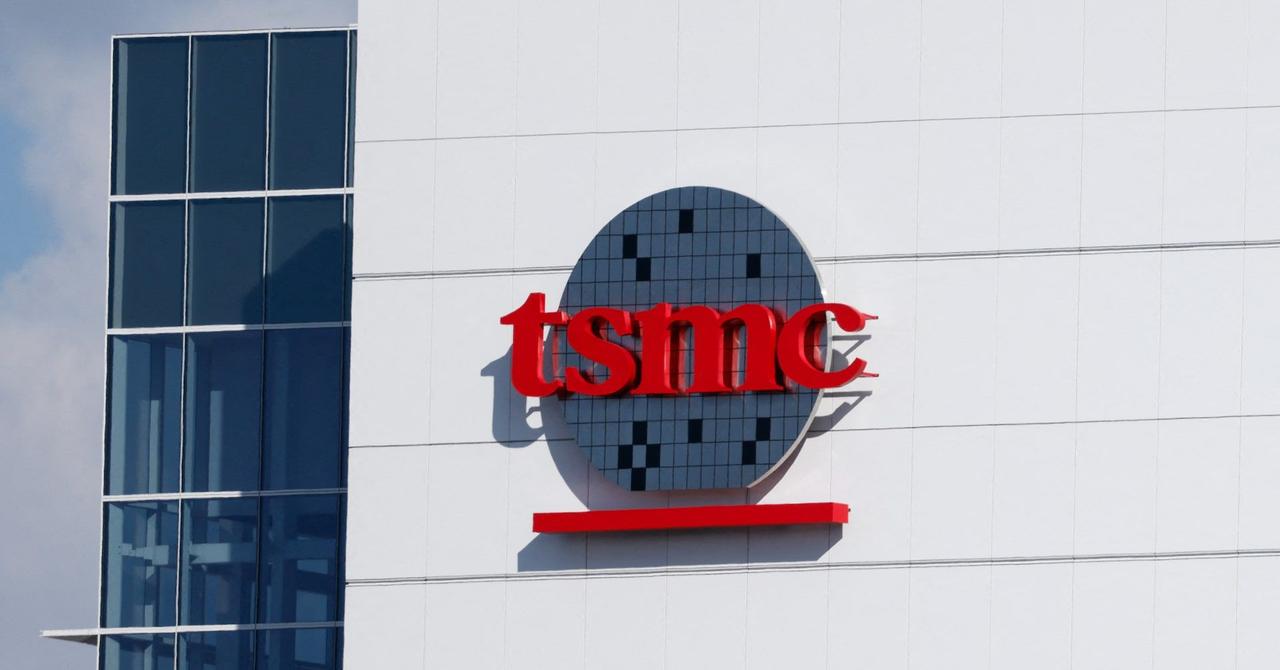TSMC Reports 40% Revenue Surge Amid Strong AI Chip Demand
2 Sources
2 Sources
[1]
TSMC May Revenue Jumps 40% as AI Chip Demand Stays Strong
January-to-May revenue of NT$1.51 trillion was up nearly 43% over the same period last year. Taiwan Semiconductor Manufacturing Co. (TSM), the world's largest contract chipmaker, reported May revenue surged nearly 40% year-over-year as demand remained elevated for its artificial intelligence (AI) chips. The U.S.-listed shares of the company, which supplies tech heavyweights such as Apple (AAPL) and Nvidia (NVDA), are rising more than 2% in premarket trading. They entered Tuesday up 5% so far this year. TSMC reported May revenue of 320.52 billion New Taiwan dollars ($10.70 billion), up 39.6% from a year earlier but down 8% from April's figure. January-to-May revenue of NT$1.51 trillion was up nearly 43% over the same period last year. In March, TSMC CEO C.C. Wei joined President Donald Trump in announcing that the firm intends to invest $100 billion in U.S.-based chip-manufacturing facilities. In the company's first-quarter earnings call in April, Wei affirmed TSMC's projection of "full-year 2025 revenue to increase by close to mid-20s percent in U.S. dollar terms."
[2]
Nvidia Supplier Taiwan Semiconductor Posts 40% Topline Growth In May, Stock Surges - Taiwan Semiconductor (NYSE:TSM)
Contract chipmaker Taiwan Semiconductor Manufacturing Co TSM stock gained on Tuesday premarket after the company reported a 39.6% jump in May revenue of 320.5 billion New Taiwan dollars ($10.7 billion). The revenue declined by 8.3% from April 2025. The topline growth reflects electronics firms striving to stockpile essential components before global tariffs kick in. Also Read: Taiwan Semiconductor Powers Alphawave's 2nm Chip Breakthrough For Faster AI And HPC Connectivity Taiwan Semiconductor reported first-quarter revenue growth of 41.6% to 839.25 billion New Taiwan dollars ($25.5 billion). Net sales declined 3.4% quarter-over-quarter. Taiwan Semiconductor guided second-quarter 2025 revenue of $28.4 billion to $29.2 billion versus the $26.79 billion analyst estimate. CFO Wendell Huang acknowledged strong demand for its 3nm and 5nm technologies and saw no change due to the tariff policies. Last week, Taiwan Semiconductor CEO C.C. Wei blamed traffic jams for delays in expanding its base in southwest Japan. Wei also reiterated the company's commitment to invest the pre-announced $100 billion to ramp up manufacturing in Arizona over the next half-decade. However, he also highlighted to President Donald Trump the difficulties in completing the monumental construction in five years due to the skilled labor crisis. Interestingly, the chipmaker's prioritization of the U.S. expansion reduced the urgency of production in Japan. Price Action: At the last check on Tuesday, TSM stock was up 2.22% at $211.60 premarket. Read Next: Keysight, Synopsys Team Up To Fast-Track RF Migration To Taiwan Semi's N4P Process Photo: Shutterstock TSMTaiwan Semiconductor Manufacturing Co Ltd$211.652.25%Stock Score Locked: Edge Members Only Benzinga Rankings give you vital metrics on any stock - anytime. Unlock RankingsEdge RankingsMomentum77.56Growth95.14QualityNot AvailableValue50.80Price TrendShortMediumLongOverviewMarket News and Data brought to you by Benzinga APIs
Share
Share
Copy Link
Taiwan Semiconductor Manufacturing Co. (TSMC) reported a 39.6% year-over-year increase in May revenue, driven by high demand for AI chips. The company also reaffirmed its commitment to invest $100 billion in U.S. chip manufacturing facilities.
TSMC's Revenue Surge Fueled by AI Chip Demand
Taiwan Semiconductor Manufacturing Co. (TSMC), the world's largest contract chipmaker, reported a significant boost in its May revenue, showcasing the growing demand for artificial intelligence (AI) chips. The company's revenue for May 2025 reached 320.52 billion New Taiwan dollars (NT$), equivalent to $10.70 billion, marking a 39.6% increase compared to the same period last year
1
2
.
Source: Investopedia
Strong Year-to-Date Performance
TSMC's impressive growth isn't limited to just one month. The company's January-to-May revenue for 2025 totaled NT$1.51 trillion, representing a substantial 43% increase over the same period in the previous year
1
. This consistent growth trajectory underscores TSMC's dominant position in the semiconductor industry and its ability to capitalize on the surging demand for AI-related technologies.AI Chip Demand Driving Growth
The remarkable revenue growth can be attributed largely to the increasing demand for AI chips. TSMC supplies chips to tech giants such as Apple and Nvidia, both of which are heavily invested in AI technologies
1
. The company's ability to produce advanced chips suitable for AI applications has positioned it at the forefront of this technological revolution.Investment Plans and Future Outlook
Source: Benzinga
In line with its growth strategy, TSMC has reaffirmed its commitment to invest $100 billion in U.S.-based chip-manufacturing facilities. This announcement was made by TSMC CEO C.C. Wei alongside President Donald Trump, highlighting the geopolitical significance of semiconductor manufacturing
1
2
.Despite the ambitious investment plans, Wei has acknowledged potential challenges in completing the construction within the proposed five-year timeframe, citing a skilled labor crisis in the U.S.
2
. Nevertheless, TSMC remains optimistic about its future prospects, with Wei projecting "full-year 2025 revenue to increase by close to mid-20s percent in U.S. dollar terms"1
.Market Response and Stock Performance
The market has responded positively to TSMC's strong performance and future outlook. The company's U.S.-listed shares saw a 2.22% increase in premarket trading, reaching $211.60
2
. This uptick adds to the stock's year-to-date growth of 5%, reflecting investor confidence in TSMC's business model and growth potential1
.Related Stories
Challenges and Considerations
While TSMC's growth story is impressive, it's not without challenges. The company reported an 8.3% decline in revenue from April to May 2025
2
. Additionally, the global semiconductor industry faces potential disruptions from international trade tensions and tariff policies. However, TSMC's CFO Wendell Huang has stated that the company sees no significant impact from these factors at present2
.Conclusion
TSMC's robust financial performance, driven by strong AI chip demand, underscores the critical role of advanced semiconductor manufacturing in the ongoing AI revolution. As the company continues to invest in expanding its manufacturing capabilities, particularly in the U.S., it is well-positioned to maintain its leadership in the global semiconductor industry and capitalize on the growing demand for AI technologies.
References
Summarized by
Navi
[1]
Related Stories
Recent Highlights
1
EU launches formal investigation into Grok over sexualized deepfakes and child abuse material
Policy and Regulation

2
Google Chrome AI launches Auto Browse agent to handle tedious web tasks autonomously
Technology

3
AI agents launch their own social network with 32,000 users, sparking security concerns
Technology








